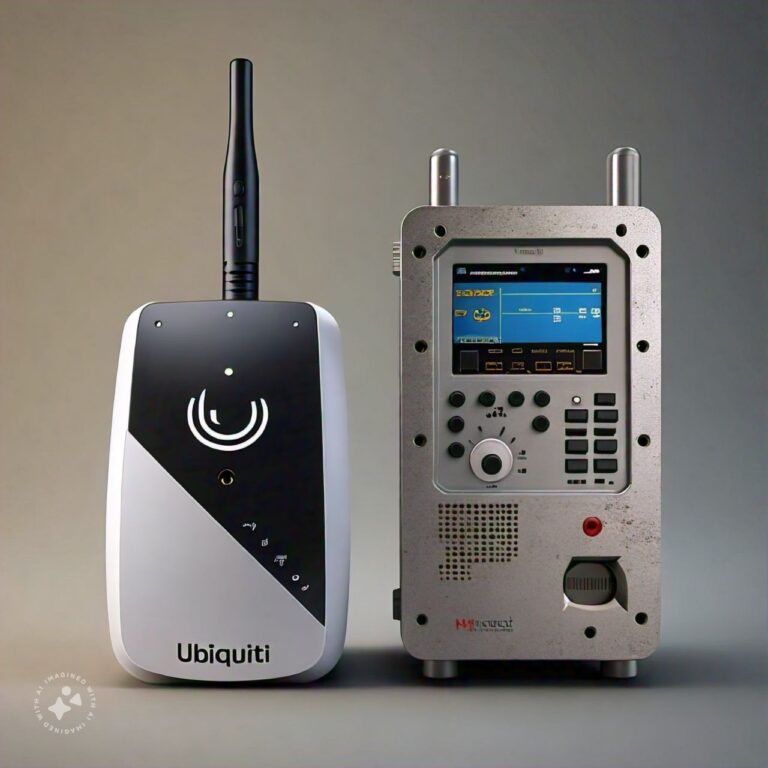
Differences Between Ubiquiti and MikroTik
Ubiquiti and MikroTik are two of the most recognized brands in the networking industry, especially for small to medium-sized businesses and network enthusiasts. Both companies are known for producing high-quality networking hardware, such as routers, switches, and wireless access points. They cater to different segments of the networking market, offering a range of products that help manage internet connectivity and network infrastructure efficiently. Ubiquiti is famous for its sleek, user-friendly designs and its software platform UniFi, which allows for easy configuration and management of networks. Ubiquiti products are often chosen by professionals and enterprises looking for reliable, scalable, and easy-to-use networking solutions.
On the other hand, MikroTik is known for its affordability and the depth of its software capabilities. Its RouterOS operating system offers a vast array of configuration options, making it a favorite among network engineers and IT professionals who need fine control over their networks. MikroTik products are particularly popular in emerging markets and among users who need powerful, customizable networking solutions at a lower price point. While Ubiquiti leans towards simplicity and a polished user experience, MikroTik caters more to users who appreciate granular control and technical flexibility. Both brands have their strengths and weaknesses, and the choice between Ubiquiti and MikroTik often depends on the user’s specific needs.
Ubiquiti Overview
Ubiquiti is a brand known for its robust and user-friendly networking products that are often used in professional environments. Below are five key aspects of Ubiquiti.
1. What is Ubiquiti?
Ubiquiti is a technology company that manufactures networking equipment, including routers, switches, and wireless access points. It is particularly well known for its UniFi platform, which provides a centralized management system for all Ubiquiti devices, allowing users to control and configure their networks easily. The company targets both enterprise customers and home users, offering a balance of performance, ease of use, and affordability. Ubiquiti’s products are designed to be intuitive and easy to deploy, making them popular among IT professionals and businesses that require scalable networking solutions.
- Networking Equipment Manufacturer: Specializes in routers, switches, and wireless products.
- UniFi Platform: Provides centralized control and easy management of devices.
2. Ease of Use
One of the major strengths of Ubiquiti is its focus on simplicity and ease of use. The UniFi software platform is designed with a user-friendly interface that allows even those with limited networking experience to set up and manage networks efficiently. The web-based controller interface provides a visual representation of the network, making it easy to monitor and troubleshoot any issues. Ubiquiti's goal is to make professional-grade networking accessible to users who may not have extensive technical backgrounds.
- User-Friendly Interface: UniFi’s interface is intuitive and easy to navigate.
- Visual Network Management: Users can view and manage the entire network via a centralized controller.
3. Product Range and Scalability
Ubiquiti offers a broad range of products, including wireless access points, routers, and switches, designed to be scalable for different network sizes. Whether you are setting up a small home network or a large-scale enterprise solution, Ubiquiti products can be easily expanded. The UniFi platform allows for seamless integration of multiple devices, ensuring that networks can grow as needed without significant configuration challenges.
- Wide Product Range: Includes everything from home networking products to enterprise-level solutions.
- Scalable Solutions: Products are designed to scale as network requirements grow.
4. Reliability and Performance
Ubiquiti is known for producing reliable networking products that deliver high performance, particularly in wireless networking. Their UniFi Access Points are highly regarded for their excellent range and throughput, making them ideal for environments where a stable and fast wireless connection is critical. In addition to solid hardware performance, Ubiquiti products are regularly updated with firmware improvements, enhancing security and functionality over time.
- High-Performance Products: Known for reliable wireless networking with good range and speed.
- Regular Firmware Updates: Ensures the network stays secure and efficient over time.
5. Pricing
While Ubiquiti is often considered more expensive than some competitors, it offers a good balance between cost and performance. Ubiquiti’s pricing is generally higher than MikroTik, especially for higher-end products, but it is still more affordable compared to traditional enterprise brands like Cisco. This makes Ubiquiti a popular choice for small to medium-sized businesses looking for professional-grade equipment without the hefty price tag.
- Affordable for Businesses: Offers good value for the price, though higher than some alternatives.
- Lower than Traditional Enterprise Brands: Less expensive than brands like Cisco.
MikroTik Overview
MikroTik is another well-known player in the networking industry, focusing on affordable and highly customizable solutions. Below are five key aspects of MikroTik.
1. What is MikroTik?
MikroTik is a Latvian company that produces networking hardware and software, with a focus on affordability and flexibility. The company’s RouterOS software is a powerful tool that allows for deep customization of networking devices, making MikroTik products highly versatile. MikroTik routers and switches are popular among network professionals who need fine control over their configurations. While the learning curve for MikroTik devices is steeper compared to Ubiquiti, the advanced features and lower cost make it an attractive option for tech-savvy users.
- Networking Equipment Manufacturer: Produces routers, switches, and wireless products with a focus on customizability.
- RouterOS: A powerful operating system for managing network configurations.
2. Customizability
One of the key advantages of MikroTik is the depth of customization it offers. RouterOS provides an extensive array of networking features, including routing, firewall, bandwidth management, VPNs, and advanced QoS (Quality of Service) settings. Users who are comfortable with networking concepts can configure MikroTik devices to perform highly specific tasks, making it a favorite among IT professionals and advanced users who need granular control over their networks.
- Extensive Customization Options: RouterOS allows for fine control over network configurations.
- Advanced Networking Features: Includes routing, firewall, VPNs, and more.
3. Affordability
MikroTik products are known for being significantly more affordable than many other networking brands. This has made MikroTik especially popular in developing markets and among smaller businesses that need powerful networking solutions but have limited budgets. Despite the low cost, MikroTik devices offer high performance, making them a strong contender in the networking space.
- Low-Cost Solutions: MikroTik products are very affordable, especially compared to Ubiquiti.
- Good Performance for Price: Offers excellent performance at a lower price point.
4. Learning Curve
While MikroTik provides incredible flexibility and power, the learning curve is one of its major drawbacks for less-experienced users. The RouterOS interface is not as intuitive as Ubiquiti's UniFi, and configuring a MikroTik device can require significant networking knowledge. This means that MikroTik is better suited for users who have a strong technical background or are willing to invest time in learning how to use the platform.
- Steeper Learning Curve: Requires a deeper understanding of networking concepts.
- Not as User-Friendly: The RouterOS interface can be intimidating for beginners.
5. Reliability and Support
While MikroTik devices are generally reliable, they may not come with the same level of support and regular firmware updates that you might find with Ubiquiti. Additionally, the user community for MikroTik is highly active, which can be a helpful resource for troubleshooting, but official customer support is not as extensive as that of more premium brands.
- Community Support: Relies more on community forums for troubleshooting.
- Fewer Firmware Updates: Not as frequent as other brands, but still maintains good reliability.
Differences Between Ubiquiti and MikroTik
- Ease of Use
- Ubiquiti: Designed for ease of use, with a highly intuitive user interface.
- MikroTik: Requires a steep learning curve and is better suited for advanced users.
- Software Platform
- Ubiquiti: Uses the UniFi platform, known for its centralized control and visual interface.
- MikroTik: Uses RouterOS, which offers extensive customization but is less user-friendly.
- Customization
- Ubiquiti: Provides limited customization, focusing on simplicity and ease of deployment.
- MikroTik: Highly customizable, allowing for advanced configuration of networking features.
- Price
- Ubiquiti: Generally more expensive, particularly for high-end products.
- MikroTik: Known for its affordability, making it popular in budget-conscious markets.
- Target Audience
- Ubiquiti: Targets both professional and casual users, with a focus on small and medium-sized businesses.
- MikroTik: Geared towards network engineers and professionals who need advanced features.
- Scalability
- Ubiquiti: Highly scalable, especially with the UniFi platform that integrates easily across devices.
- MikroTik: Also scalable but requires more manual configuration as the network grows.
- Wireless Performance
- Ubiquiti: Known for excellent wireless performance and range, especially with their access points.
- MikroTik: Provides good performance but is not as well-known for wireless capabilities.
- Support and Updates
- Ubiquiti: Regular firmware updates and professional customer support.
- MikroTik: Relies more on community support, with fewer updates.
- Hardware Design
- Ubiquiti: Sleek, modern designs that appeal to users looking for aesthetically pleasing hardware.
- MikroTik: More utilitarian designs, focusing on function over form.
- Market Presence
- Ubiquiti: Popular in the U.S. and Europe, widely adopted by businesses and professionals.
- MikroTik: Popular in developing markets due to its affordability.
Conclusion
Both Ubiquiti and MikroTik offer strong networking solutions, but they cater to different user needs. Ubiquiti focuses on simplicity, ease of use, and scalability, making it an excellent choice for small to medium-sized businesses and users who prioritize a sleek, user-friendly experience. MikroTik, on the other hand, shines with its affordability and advanced customization options, appealing to IT professionals and network engineers who need granular control over their networks.
Choosing between Ubiquiti and MikroTik ultimately depends on the specific requirements of your network. If you are looking for an easy-to-use, scalable solution with regular updates, Ubiquiti is the better option. However, if you need more control, flexibility, and a lower-cost solution, MikroTik offers excellent value. Both brands have their strengths, and understanding their differences will help you make the best decision for your networking needs.
FAQs
Related Topics
- All
- Animals
- Diseases
- Health
- Money
- Politics
© 2024 OnYelp.com. All rights reserved. Terms and Conditions | Contact Us | About us





